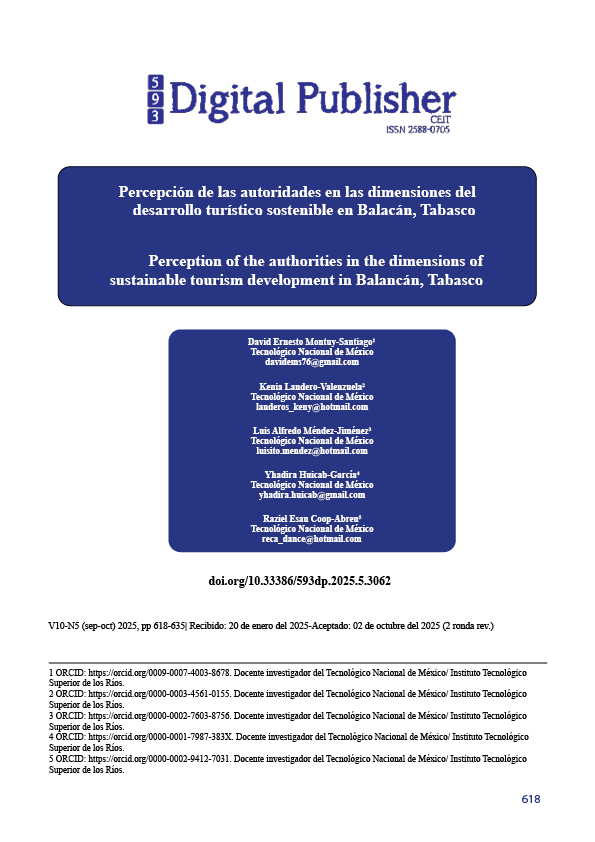Perception of the authorities in the dimensions of sustainable tourism development in Balancán, Tabasco
Main Article Content
Abstract
This research analyzes the sociocultural, economic, and environmental dimensions, identifying the factors that contribute to sustainable tourism development in the municipality of Balancán, Tabasco.
According to local authorities, the positive factors promoting sociocultural development are that tourism brings more benefits than drawbacks, while a limitation is that tourism has not led to changes in local customs and traditions. In the economic dimension, positive factors include restaurants and the good value for money of local products and services; a limiting factor is the poor focus on entertainment in tourist activities. In the environmental dimension, positive factors include the quality of tourist attractions, while a limiting factor is the lack of cleanliness in streets and public areas. It was noted that responsibility for these dimensions lies with the stakeholders within the communities.
The research used a non-experimental, mixed-methods design, with quantitative data collected through a 27-item survey. This survey addressed factors that promote or limit tourism development in the municipality. Frequency statistics and qualitative analysis were used to identify the factors within each dimension. A descriptive approach was used when reporting the results. Eight communities were selected for the study, chosen based on convenience. Direct observation was also used during data collection.
The conclusion is that local community development should be approached from a perspective where stakeholders are responsible for redoubling their efforts to minimize environmental damage, prioritizing the community's economic activities and fostering a sense of ownership and empowerment within the communities, thus enhancing their capacity as promoters of development.
Downloads
Article Details

This work is licensed under a Creative Commons Attribution-NonCommercial-ShareAlike 4.0 International License.
1. Derechos de autor
Las obras que se publican en 593 Digital Publisher CEIT están sujetas a los siguientes términos:
1.1. 593 Digital Publisher CEIT, conserva los derechos patrimoniales (copyright) de las obras publicadas, favorece y permite la reutilización de las mismas bajo la licencia Licencia Creative Commons 4.0 de Reconocimiento-NoComercial-CompartirIgual 4.0, por lo cual se pueden copiar, usar, difundir, transmitir y exponer públicamente, siempre que:
1.1.a. Se cite la autoría y fuente original de su publicación (revista, editorial, URL).
1.1.b. No se usen para fines comerciales u onerosos.
1.1.c. Se mencione la existencia y especificaciones de esta licencia de uso.
References
Cáceres, F. R., Hermández, R. M., & Ruiz, B. E. (2021). Despoblación, Turismo Comunitario y Resiliencia comunitaria en el Soroeste de España. Journal of rural Studies, 108-116.
Chávez, L. T. (2021). researchgate.net. Obtenido de Google Academico : https://www.researchgate.net/profile/Tzintli-Chavez-Luna/publication/380731473_CRITICA_AL_ENFOQUE_ADMINISTRATIVISTA_DE_LA_DEFINICION_DE_TURISMO_DE_LA_OMT_UNA_PROPUESTA_HERMENEUTICA_DIALECTICA_INTERPRETACIONAL_A_critique_of_the_administrativist_approach_to
Cardoso, J. C. (2006). Turismo sostenible: una revisión conceptual aplicada. El Periplo sustentable - Red de Revistas Científicas de America Latina, el Caribe, España y Portugal., 10.
Lopez, P. G., & Palomino, V. B. (2001). El Ecoturismo Sustentable como Estrategia de Desarrollo . México: Porrua.
Lopez, T. V. (2024). Impactos del turismo desde la percepción ciudadana: Desarrollo y validación de una escala para su medición. Revsita de Ciencias Sociales (RCS), 361-379. Obtenido de Google Académico .
Arámburo, L. D., & Olmos, M. E. (2024). Estado del conocimiento del Turismo comunitario a partir de los bienes comunes desde un enfoque Global y Mexicano (2016-2023). Dimensiones Turisticas , 1-22.
Garrido, L. L., Aguilar, L. M., Enith, A. R., & Angulo, T. L. (2025). El turismo comunitario como alternativa de desarrollo sustentable . Ava Cient, 26-38.
Guadarrama, B. A. (16 de Diciembre de 2022). Repositio TecNM . Obtenido de https://rinacional.tecnm.mx/bitstream/TecNM/5026/1/GUADARRAMA
Guardarrama, B. A. (2022). Repositorio TecNM. Obtenido de https://rinacional.tecnm.mx/bitstream/TecNM/5026/1/GUADARRAMA
Gutierrez, G. E. (2022). Turismo Sostenible: Reactivación Economica en Tiempos de COVID-19. Perú: Universidad Nacional Autonoma de Huanta.
INEGI. (15 de Diciembre de 2023). Instituto Nacional de Estadistica y Goegrafía. Obtenido de Cominucado de prensa número 817/23: https://www.inegi.org.mx/app/saladeprensa/noticia.html?id=8724
Marroquin, N. L., & Triana, V. M. (2011). Repositorio. autonomo.edu.com. Obtenido de Scholar.google.es: https://repositorio.autonoma.edu.co/handle/11182/401
Mercado, A., & Y, C. (2021). Dimensiones del Turismo Sostenible. Vida Cientifica, 33-34.
Monsalve, P. M., Tovar, M. A., & Salazar, A. E. (2023). Revisión Documental sobre el Turismo Ssotenible en el Marco de las ODS. Journal de Tourism & Development, 137-153.
Morales, P. M. (2006). Desarrollo local sostenible. Economia y desarrollo- Red de Revistas Cientificas de America Latina, el Caribe, España y Portugal, 64.
Morales, P. M. (2006). Eldesarrollo local sostenible. Economia y Desarrollo, 60-71.
OIT. (07 de julio de 2022). Los trabajadores de las zonas rurales se enfrentan a graves déficits de trabajo decente. Obtenido de Organización Internacional del Trabajo: https://www.ilo.org/es/resource/news/los-trabajadores-de-las-zonas-rurales-se-enfrentan-graves-deficits-de.
Osuna, F. I. (2024). Situación Actual del Turismo Sustentable en México. Revista Cientifica Arvitrada de la Fundación MenteClara , 1-14.
Pegalajar, P. M., Burgos, G. A., & Martínez, V. E. (2022). Educación para el Desarrollo Sostenible y Responsabilidad Social: claves en la formación inicial del docente desde una revisión sistemáticaEducation for Sustainable Development and Social Responsibility: Keys to initial teacher training from a systematic . Revista de Educación para el Desarrollo Sostenible y Responsabilidad Social, 421-439.
Perijil, J. (2018). Turismo solidario y Turismo Responsable, Aproximación a su Marco Teorico. Revista Iberoamericana de Economia Solidaria e InnovaciónSocioecologicas, 23-48.
Robertis, P. (2007). La intervención colectiva del trabajo social. Buenos Aires, Argentina: Sela Sierrra.
Saeteros, H. A., Da, S. E., & Flores, S. M. (2019). Turismo sustentable y los diferentes enfoques, aproximaciones y herramientas para su medición. Revista de Turismo y Patrimonio Cultural., 903.
Solis, M. J., Neira, N. M., Gonzalez, R. C., & Mantilla, C. X. (2024). Factores que indicen en el turismo sostenible de Cojitambo - Ecuador. Revista de Ciencias Sociales, 345-360.
Staff, E. T. (15 de Abril de 2021). Breaking. Obtenido de Entorno Turístico - _Hablemos de turismo: https://www.entornoturistico.com/que-es-el-turismo/
Valadez, R. (28 de Febrero de 2024). MILENIO . Obtenido de Los 5 países que están por delante de México en el ranking de turismo mundial de 2023: https://www.milenio.com/negocios/omt-mexico-mantiene-posicion-6-en-ranking-mundial-2023-de-turismo






